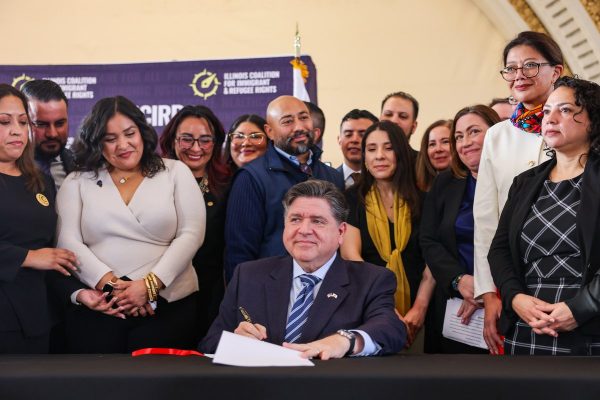Videoconferencing allows soldiers and families to talk
Jun 20, 2006
Last updated on May 12, 2016 at 03:24 a.m.
It was an idea that awoke Nancy Komlanc in the middle of the night and a dream come true for soldiers in Iraq and their families.
The University announced last week that it will once again use advanced videoconferencing technology to host the “See your soldier” event on July 11 and 12. Last December, the University organized a similar, but only local, event.
This time, family members can visit one of several sights in Illinois for a live, 30-minute interactive videoconference with their soldier stationed in Iraq. The event is being organized by the National Center for Supercomputing Applications and the University of Illinois Extension.
“It makes such a difference to actually see and talk to your loved one and know they are safe,” said Komlanc, director of education at National Center for Supercomputing Applications’s Technology Research, Education and Commercialization Center, and coordinator for the videoconferencing sessions.
Get The Daily Illini in your inbox!
Komlanc says the idea originally hit her one morning last fall at 4:30 a.m., and after only three weeks of planning, families were speaking live to their loved-ones abroad.
“I had been going to a lot of conferences, and I ran into an organization that sets up videoconferencing opportunities between soldiers and families,” Komlanc said. “At the same time, National Center for Supercomputing Applications had just moved into a new building. It was a combination of networking, good timing and a huge team effort.”
After the success of the event in December, the National Center for Supercomputing Applications decided to host another videoconference close to Independence Day on a larger scale. Eight locations across the state are available for families to speak with soldiers stationed at either the Air Force Camp Al Asad or the Army Camp Taji/Cooke in Iraq.
“The Extension offices around the state have the same basic technologies, and they were really enthused about it,” Trish Barker, National Center for Supercomputing Applications spokesperson said. “Now families don’t have to travel a long distance, they can go where they need to.”
According to Barker, event coordinators have been working with a staff sergeant overseas to help handle the logistics.
“We have to remember that the soldiers are doing jobs out there, and we have to work around their schedules,” Barker said.
Komlanc said that future “See your soldier” events are likely if there is a need.
“Of course, if the troops come home, that will be even better,” she said.





